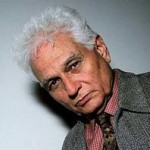My first question when I faced those four texts was, how can I read them? Then, I realize that there was actually a kind of “order” to do it. Of course, is not the way to do it, but was a guideline. That`s the interesting thing about reading and following a debate or a confrontation of different authors. Sometimes, we read two different texts that talk about similar issues, we can put them to talk between them, and then, to discuss among other texts that discuss similar topics or ideas. Anyway, is always more interesting, at least for me, to read something that is “directed” (of course Derrida would not agree with this) to someone. So, I took the road of read those texts as a discussion. First, I read Austin, then, Derrida`s text called “Signature event context”, then, the Searle`s text (I will keep his name), and finally, the Derrida`s answer to Searl.
Following this reading I will not focus on any text to deep, and I will try to figure out how can the big picture looks like (if there is one). Austin (along with Wittgenstein) was one of the first philosophers in start developing a philosophy of language in the XX Century. As we know after his reading, his main focus is in the relation of language and the world that would be outside of it. In other words, and it is what gives the title of his main work, “How to do things with words”. His idea (or at least how I read it) is/was that language can escape the limits of the own language and have a relevant role in some kind of “extra linguistic” circumstances. In other words, some utterance are able to modify reality of people. A good example of this it is when a priest (in a Christian tradition) says “I now declare you man and wife”, and starting from that moment, the couple is actually married. Of course, in order to have a “happy ending” for this situation, Austin says that there is a group of conditions that must be fulfilled. The situation in what this utterance is involved would be the context (for me, one of the most relevant concepts of the discussion). If some of the conditions is not fulfilled, let’s say that the woman was already married or the scene happened on a stage in a theatre, the utterance loose it’s performative force.
A few years latter, Derrida spoke in a philosophical meeting about the issue of writing. Then, at least in my read, he made a distinction about writing and spoken language, and didn`t take much care about the last one. His main focus is about written language. But after making his main proposal about it, he started to discuss some issues related to Austin`s work. I think that one of the main points was about his (Austin) notion of context. According to Derrida there is no way to access to any kind of “objective” or “total” context , so there would be no way to establish the circumstances that surround any speech act. But is further than “just the context”, is a matter about intentions. For the French philosopher, there is no way either to access to the “real intentions” of any speaker. That`s one of the main characteristic of writing (for him), that can survive even after the dead of it’s author and the receiver. In order words, the writing exists by it self. Doesn’t need concepts like intentions, author, context of production, etc.
After this “aggression” to Austin, one of his disciples decided to reply to Derrida. For Searle, Derrida had a misreading of Austin’s text (actually, for Searle seems to be that Derrida didn’t understand a word). The American philosopher states that all Derrida`s argument are lack of force and make big confusions about concepts like iterability and permanence. For Searle, speech acts do exist and elements such as context and intentions may be accessed in order to study them.
Of course, Derrida answered. In his very characteristic style, the French philosopher answer to the short “reply” of Searle with almost a whole book (I can’t unmentioned this element). Derrida starts with an exercise of deconstruction about Serle`s text. First, he discussed the authorship of it making fun of the “copyright” of the text, and finally, reducing him to an acronym that, of course, looks like his name: Sarl. It seems to be that one of the mains point of disagreement about them are the ideas of “truth”, “real”, etc. In some way, and I agree about that, Searle claims to have “the right reading” of Austin. Finally, the text discuss about the notion of context, the role of signature (especially talking about Searle`s copyright and his own signature at the end of his previous text), in other word, going back to the arguments presented in SEC. And of course, never stops of making fun of Searle.
More than focus and choosing some positions, I would like to keep the issues that are being discussed here. As I said before, for me one of the main concepts (and that is extremely interesting when we want to think about other disciplines outside literature and philosophy) is the concept of context. Some people believe that knowing the context of an utterance we would be able to get to the “real signification” or the “intention” under it. Derrida, as we saw, doesn’t. And on the other hand appear the concept of writing (can we make a direct relation with the notion of text?). Both ideas are, nowadays, on opposite sides. That’s why for me this debate is interesting. Because show a discussion about something that is still in the arguments in literary theory. That means, at least for me, which is an issue that must be keeping discussed.


